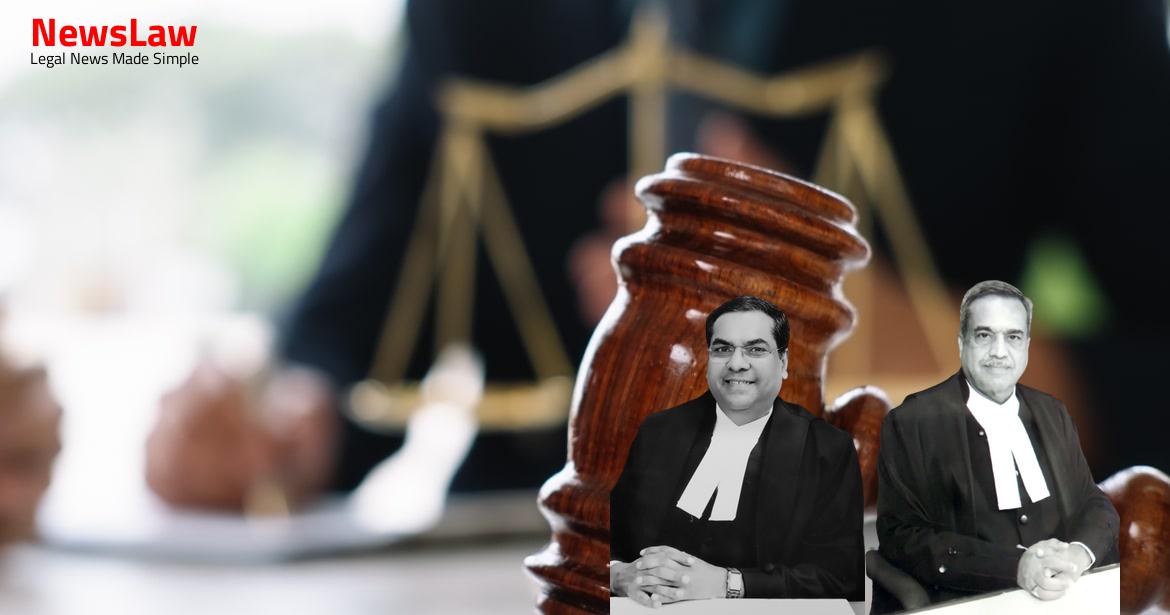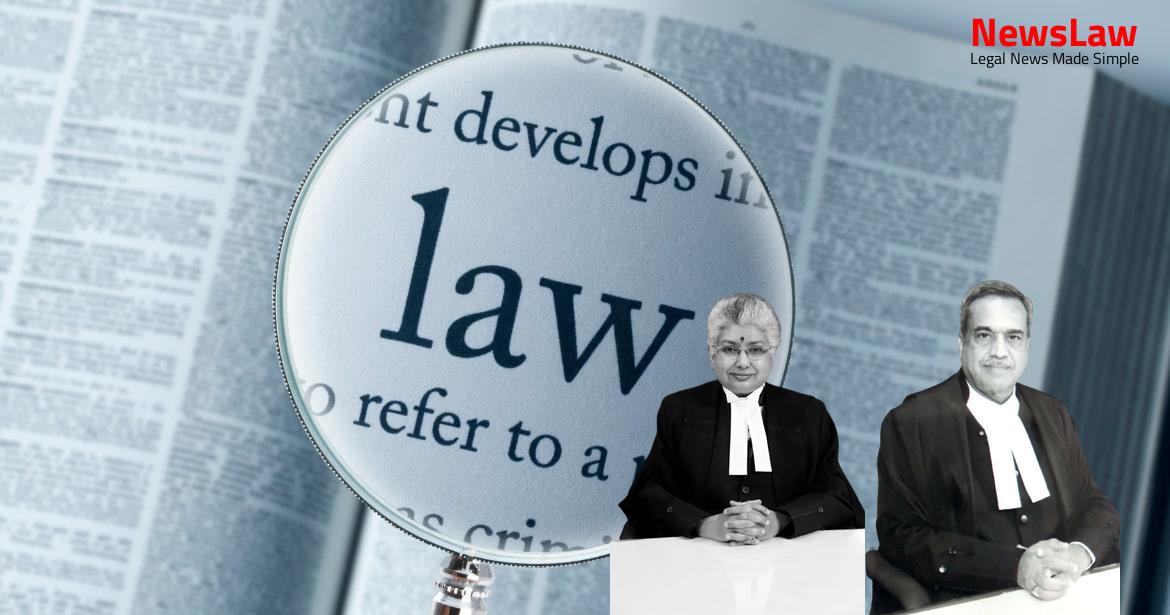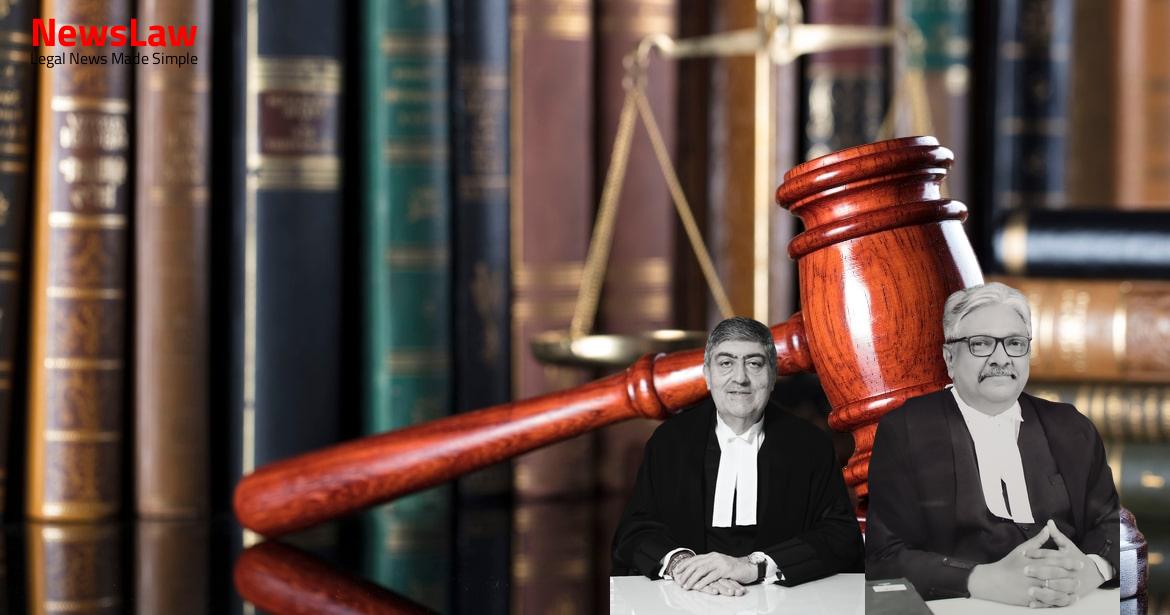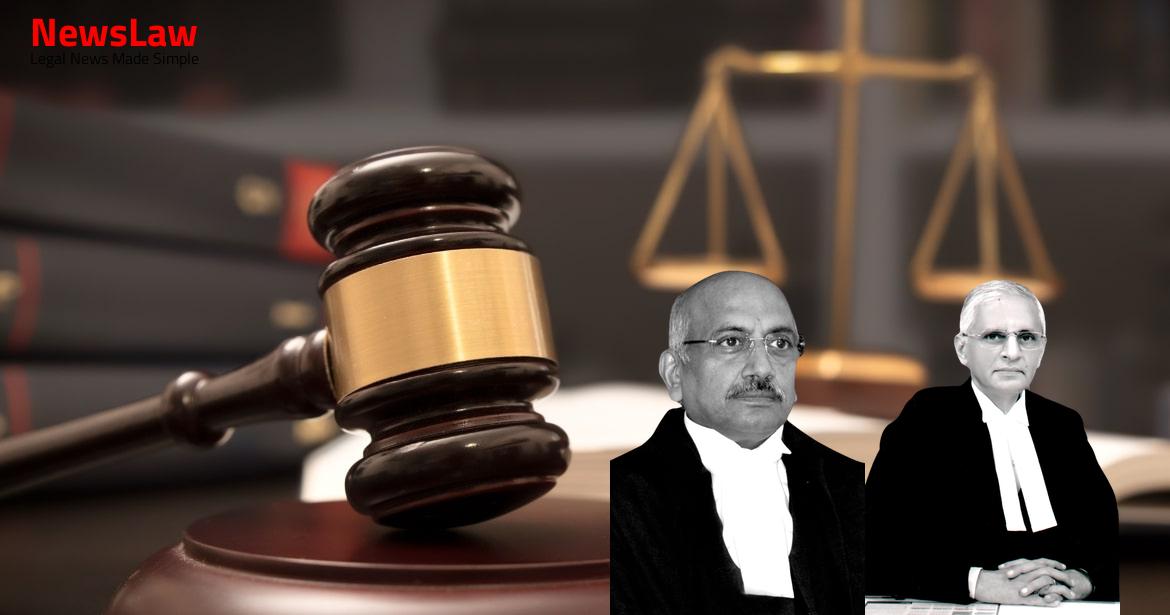This summary focuses on the court’s profound legal analysis regarding employee representation rights in disciplinary proceedings. It explores the intricate balance between procedural fairness, natural justice, and the discretion of courts in granting remedies. The discussion sheds light on the significance of adhering to the principles of natural justice while considering the impact of delay, laches, and acquiescence on legal proceedings. Dive into the complexities of employee rights and legal procedures in this compelling exploration of the law’s application in disciplinary matters.
Facts
- The respondent filed a memorandum of appeal on 20.09.1989 after being dismissed nearly four years and five months prior.
- The Chief General Manager did not attend to the appeal for over nine years.
- The respondent requested to be defended by an outsider but was denied, leading to an adjournment for representation preparation.
- The respondent was given two weeks to approach the Board of Directors for direction after requesting a long adjournment on 05.09.1984.
- The respondent did not appear on 20.09.1984, seeking a one-week postponement on medical grounds through his brother.
- The inquiry officer directed the respondent to specify relevant documents in the context of his defense.
- The appeal filed by the respondent on 20.09.1989 was rejected by the Chief General Manager on 23.01.1999 after considering the inquiry report and other relevant documents.
- The respondent filed O.P. No 5527 of 1999 before the High Court, challenging the rejection of his appeal and seeking reinstatement with back wages.
- The High Court allowed the writ petition on 14.03.2007 primarily due to the rejection of the respondent’s request for representation by the organizing secretary of the All-India Confederation of Bank Organizations, Kerala Unit.
- The deposits and advances of the bank increased significantly during the respondent’s tenure as the manager of the Quilon branch.
- The respondent’s dismissal from service was justified based on the grave charges proved against him.
- The respondent participated in the inquiry and admitted to unauthorized advances made beyond his discretionary powers.
- The inquiry officer passed a detailed order rejecting the respondent’s request for specific documents and considered them unnecessary and irrelevant.
- The respondent had not been cautioned or reprimanded regarding the business conduct of the branch.
- The Chairman of the Bank of Cochin dismissed the respondent from service on 18.04.1985.
- The respondent had sent a representation on 25.02.1985, which was duly considered.
- The inquiry officer’s report based on evidence found that the respondent had exceeded authorization in grant of credit facilities and flouted head office instructions.
- All charges against the respondent were held to be proved.
- The Single Judge observed unauthorized advances beyond discretionary powers or without the sanction of the head office.
- The Division Bench noted that the respondent had retired and allowed the continuation of disciplinary proceedings if rules permitted.
- The charges against the respondent were deemed specific and detailed, although relevant provisions of the Service Code were not mentioned.
- The respondent was entitled to be represented by a union or association representative, and his choice of representation should have been accepted.
- The judgment rejected the argument that proven charges only constituted ‘minor misconduct.’
- The Division Bench upheld the Single Judge’s decision to quash disciplinary proceedings due to a violation of the Service Code clause.
- Prejudice was found to have been caused to the respondent, leading to the allegations in the charge sheet being classified as ‘gross misconduct.’
- The inquiry officer and presenting officer were experienced lawyers, yet the contention of no prejudice was rejected by the Bench.
- The Single Judge and Division Bench emphasized the importance of following principles of natural justice as outlined in the Service Code.
Also Read: Land Auction Dispute Resolution
Arguments
- The right to be represented by a third person in domestic inquiries/tribunals is not restricted to maintain the freedom of representation by a counsel or agent of one’s choice.
- This right is not automatically considered a fundamental aspect of natural justice; its denial does not immediately invalidate the inquiry.
- Representational rights can be limited by specific laws like Section 36 of the Industrial Disputes Act, 1947, and certified Standing Orders.
Also Read: Analysis of Bail Conditions in Criminal Appeal No. INSC 48/2024
Analysis
- The respondents failed to challenge their retirement in a timely manner, resulting in a lapse of a couple of years before filing writ petitions for benefits.
- The judgments in question did not adequately consider the defense presented by the respondents and whether that defense was effectively denied.
- Laches and acquiescence have different implications in legal contexts.
- Acquiescence implies active assent, while laches refers to simple passivity.
- Lapse of time and delay are critical factors in determining laches.
- The respondents were considered to have acquiesced to their retirement by not challenging it in a timely manner.
- The respondents were found to be inactive and acquiescent until the filing of the appeal, not after.
- Fairness dictates that appeals should be filed within a reasonable time to ensure a fair hearing.
- Delay and laches can be used to non-suit litigants who approach the court belatedly without sufficient justification.
- Definition clauses in legal documents should be carefully considered for their implications in interpreting provisions.
- Prejudice, change of position, and third-party interests play crucial roles in determining the impact of delays in legal proceedings.
- The relief granted in a judgement can have significant financial repercussions.
- Court rulings on alleged breaches of natural justice can have various nuances when facts are in dispute.
- Laches and acquiescence can prevent litigants from claiming violations of rights if there is no real prejudice caused by the delay.
- The gravity of delay and its impact on the parties involved should be carefully assessed in legal proceedings.
- Acquiescence can destroy a person’s right to claim violations if established through conduct.
- The absence of an article ‘the’ in a clause does not necessarily invalidate the defined meaning of a term within a legal document.
- Employee must be given a charge sheet with clear details of the circumstances against them
- Sufficient time must be given for the employee to prepare and provide their explanation and evidence in defense
- The employee has the right to appear before the officer conducting the enquiry, cross-examine witnesses, and present evidence
- The employee can be defended by a representative of a registered Union/Association of bank employees or by a lawyer with permission from the bank
- The employee must be given a hearing regarding the proposed punishment if any charge is established against them
- Courts have the discretion to refuse certain remedies even when natural justice is not followed.
- In cases where statutory provisions requiring notice differ depending on individual benefit or public interest, the distinction determines if the provision can be waived.
- The importance of showing prejudice to receive relief is emphasized.
- Statutory authorities failing to comply within a reasonable time should not use laches and delay as a defense.
- The right to be represented by counsel can be regulated by law.
- The breach of the natural justice rule does not necessarily indicate prejudice.
- The decision to refuse relief even if natural justice is followed depends on the view of ‘real substance’ or the likelihood of success.
- The ‘useless formality’ theory has been criticized and debated in various cases.
- The principle of acquiescence is discussed in relation to delay and laches.
- Procedural fairness is essential for the accuracy of decisions.
- The rules of natural justice are flexible and their application varies based on the circumstances.
- The need for procedural fairness and natural justice under the Constitution is highlighted.
- The delay in taking action by the State should not result in denying genuine claims.
- The right to be represented by counsel is not an absolute right and can be regulated by law.
- The inherent procedures in quasi-judicial or administrative powers aim to ensure a just and fair decision.
- The exercise of writ jurisdiction is discretionary and considers the conduct of the parties.
- The dues payable to the respondent as per the judgment were released on furnishing security to the Chief General Manager.
- The Chief General Manager’s hesitation to dismiss the appeal due to directions from the Constitutional Court is understandable.
Also Read: Conviction Upheld for Murder and Concealment of Body
Decision
- The amount released has been kept in a fixed deposit.
- The order of dismissal is upheld, and the writ petition filed by the respondent is treated as dismissed.
- The appellants are entitled to enforce the security furnished by the respondent.
- Directions were issued for consideration and disposal of the appeal, which was interpreted as a direction to decide the appeal on merits.
- The payment released is directed to be returned to the appellant bank without interest within six weeks.
- If payment is not made within the stipulated period, the respondent will be liable to pay interest at 8% per annum from the date of judgment.
- The present appeal is allowed, and the impugned judgment is set aside and quashed.
- The appeal was dismissed on merits.
Case Title: CHAIRMAN, STATE BANK OF INDIA Vs. M.J.JAMES (2021 INSC 732)
Case Number: C.A. No.-008223-008223 / 2009



